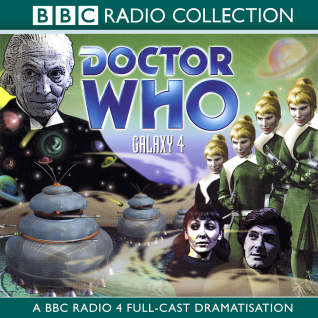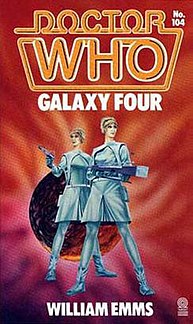 The single most frustrating thing about re-watching Doctor Who from the outset again was
bound to be reaching this point. After
the relative safety of seasons 1 and 2, and how almost all of it existed with a
few tragic exceptions, I’ve now reached the point where the BBC’s wrecking
strategy had the hardest effect – and the first serial of the series, Galaxy 4, is by far the dullest of this
stretch. What makes this even more
frustrating, of course, is that as of Christmas last year, episode 3 has been recovered, but in the endless
quest for cash, the BBC hasn’t yet made it available. As such, I was forced to sit through all 4
episodes in disjointed form, through the audio track – which is frankly rather
poor quality – and the existing telesnaps, with the occasional few minutes of
surviving footage instated. Again, my
huge vote of thanks must go to matrixarchive, whoever he or she is, for making
this available through dailymotion.com.
The single most frustrating thing about re-watching Doctor Who from the outset again was
bound to be reaching this point. After
the relative safety of seasons 1 and 2, and how almost all of it existed with a
few tragic exceptions, I’ve now reached the point where the BBC’s wrecking
strategy had the hardest effect – and the first serial of the series, Galaxy 4, is by far the dullest of this
stretch. What makes this even more
frustrating, of course, is that as of Christmas last year, episode 3 has been recovered, but in the endless
quest for cash, the BBC hasn’t yet made it available. As such, I was forced to sit through all 4
episodes in disjointed form, through the audio track – which is frankly rather
poor quality – and the existing telesnaps, with the occasional few minutes of
surviving footage instated. Again, my
huge vote of thanks must go to matrixarchive, whoever he or she is, for making
this available through dailymotion.com.
In preparation for this, and on my way to the cinema to see
the newest Batman film (which was incredible) I re-read the Target
novelisation, and thoroughly enjoyed it.
It is actually exceptionally well-written, and tells quite a taught and
interesting story. Sadly, the televised
serial contains none of this charm or interest.
That said, I will be referring the novelisation throughout.
From the opening of episode 1, there is quite an interesting
sense of tension – the Doctor flippantly refers to the silence across the
planet, and there is a throwaway reference to The Space Museum, as he likens the quiet to that on Xeros when the
crew “skipped a time track”. The crew
have clearly bonded in their time together between seasons 2 and 3, as the
Doctor mentions that it will be nice to have a rest, and as such this silent
restful world would make the perfect respite stop.
Vicki’s innocence as a character is wonderfully played by
Maureen O’Brien, and she is incredibly entertaining throughout this serial –
her assertion that the robots outside have a “chumbley” sort of movement,
before quietly mumbling it a second time after Steven and the Doctor’s scorn at
the name, is lovely, but the name sticks.
The Chumblies themselves are brilliantly realised, and their design is
fantastic – the way in which they fold into themselves under fire is wonderful,
and whilst the sound effects which accompany them are irritating in an
audio-only form, I’m sure that on original transmission they were rather engaging.
Where this serial really suffers, though, is the rather
by-the-numbers twist. From our first
sighting of the Chumblies, it is almost impossible to imagine them as ‘villains’. They are simply too cute. And once we meet the Drahvins, it is even
more evident – these cold-faced, vacant beauties are evidently not the good
guys they are purportedly suggested as. They
come across as too standoffish from the outset, and as such undermine any
possible plot twist straight off.
 The Drahvins are quite marvellous though – Stephanie Bidmead
as Maaga in particular is fantastic, and as the serial progresses she becomes
more and more identifiable, despite her harsh exterior. The scenes in episode 3 are beautifully
performed, as she looks around her, at her derelict ship, and her mindless soldiers
born in test tubes with no intellect and no personal drive, and as she explains
to them that she is stuck with them as companions despite the fact that they do
not even have the imagination to try and perceive death is fantastic. A difference between the novelisation and the
televised serial is that, during episode 1, Maaga states that the planet will
die within 14 dawns, and claims that she knows this because the Rills told them
so. In the novel, though, she states
that she had worked this out, and her theory was proven by the Rills who
confirmed her theory. By not including
this, it does somewhat undermine the intelligence which allegedly lurks behind
those cold and calculating eyes.
The Drahvins are quite marvellous though – Stephanie Bidmead
as Maaga in particular is fantastic, and as the serial progresses she becomes
more and more identifiable, despite her harsh exterior. The scenes in episode 3 are beautifully
performed, as she looks around her, at her derelict ship, and her mindless soldiers
born in test tubes with no intellect and no personal drive, and as she explains
to them that she is stuck with them as companions despite the fact that they do
not even have the imagination to try and perceive death is fantastic. A difference between the novelisation and the
televised serial is that, during episode 1, Maaga states that the planet will
die within 14 dawns, and claims that she knows this because the Rills told them
so. In the novel, though, she states
that she had worked this out, and her theory was proven by the Rills who
confirmed her theory. By not including
this, it does somewhat undermine the intelligence which allegedly lurks behind
those cold and calculating eyes.
There’s some five minutes of existing, almost uninterrupted movement
in episode 1, which is a welcome relief – and also provides a moment of
(probably) unintentional humour too, whilst the TARDIS crew are being held “prisoners”
by the Drahvins – Hartnell, whilst discussing the lack of men on Drahva, is
waving his arm around, gesticulating, whilst discussing the anatomical
differences between men and women – and whilst doing so is purposefully waving
his hand in front of Maaga’s vagina. It’s
childish of me, I know, but I couldn’t help giggling...
The first episode ends on a rather dramatic close-up of
Hartnell’s wonderfully expressionate face where, having checked the Astral maps
– first seen in The Web Planet – and confirming
that the Rills were correct about the destiny of the planet, but their
calculations are incorrect; “Tomorrow is
the last day this planet will ever see.”
Episode 2 is where things start to go a little downhill for
me – as much of the soundtrack is simply the incessant beeps and whirrs of the
Chumblies. Indeed, there are some scenes
in which there is merely awkward grunting noises and the like. I presume, from reading the novelisation,
that this is the scene in which the Doctor and Steven are trapped in a pit. There is a rather obscure line of dialogue,
which sounds something like “Guy Fawkes must have been resurrected!” At least, I think that’s what it is... I genuinely couldn’t tell.
Considering the dramatic cliffhanger of episode 1, nothing
much seems to happen. There’s no urgency
about everything – the Doctor and Steven toddle off to the TARDIS in no rush at
all, then following the discovery they decide to stay inside the ship while a
Chumbley tries to break in, and then they saunter back to the ship where Vicki
remains with the Drahvins. It’s so
slow-paced, under-dramatic and... well, boring.
The great reveal of the Rill at the end of episode 2 is
relatively well handled, we can presume, although since we don’t have any footage upon which to base this,
merely meagre, low-quality photos. And
then we get to the most irritating thing for me about this serial – episode 3
EXISTS! Within the BBC, somewhere, there
is a copy of this episode, which will one day be released on DVD, no doubt for
a relatively extortionate price, but until then, all we have are the
recons. Which do not do the story
justice – again, too much of episode 3 is evidently interesting set pieces, but
simply sounds frustrating with no visual to match. That said, there are some lovely moments –
the Rill voice, provided by Robert Cartland is fantastic, a soft and soothing,
yet powerful and booming voice. The tone
is lovely. Similarly, once the Doctor is
prevented from destroying their life-support system, which converts oxygen into
an ammonia gas, he has an interesting discussion with the Rill, staring above
the translating Chumbley, speaking up into the air. It’s an interesting choice, but one which
works very effectively.
The moral of the whole story is rather basic, of course –
appearances can be deceptive, and you shouldn’t judge a book by the cover. The Rills, whilst ugly, are intelligent and
peaceful. The Drahvins are beautiful (in
a very 60s way, mind) but are sadistic and cruel. And they are never more sadistic than in the
very drawn-out cliffhanger, with Steven trapped within the “Air Lock” of the
title, the oxygen being slowly drawn out and with no chance of rescue. Beyond the air lock doors, a Chumbley stands
waiting (Steven still doesn’t know that they’re the good guys) and in the ship,
Maaga and her cronies stand waiting, armed, should he elect to return into the
ship. Once the oxygen level reaches a point,
though, he has no hope at all; the doors cannot open without re-pressurising and
so he is doomed to suffocate as the end credits roll.
Episode 4, considering the fast pace that is needed for the
Rills and the TARDIS crew to escape, continues to dawdle to its inevitable
conclusion. The majority of the action
is focussed on the Doctor connecting an energy lead to the TARDIS to charge the
Rills’ ship. Other than a brief moment
of interesting dialogue, where Steven questions the alleged ambivalence and
selflessness of the Rills, there is little of interest throughout.
What is tragic, though, is the conclusion – I feel
terrifically sad that one of the Chumblies was forced to remain on the
eponymous “Exploding Planet”. Whilst the
Rills and the TARDIS crew remain, the sentinel sent to guard the crew and the
Drahvins are left to expire with the planet.
The ending is fascinating, though – as the Doctor and his
companions look at the scanner, Vicki murmurs “Look at that planet. I wonder what’s going on there?” and the
action cuts to the planet surface, and Jeff Garvey muttering “I remember now –
I must... I must kill... I must kill!”
grasping at something on the side of his neck.
This neatly leads us into the next episode, utterly unique as we take a Mission to the Unknown.







No comments:
Post a Comment